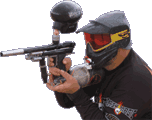  |
|
|
|
|
|
|
  |
|
|
|
|
|
|
WHY THERE ARE NO SCORES
WE WON'T MAKE UP WHAT DOESN'T
EXIST
by Bill Mills
Skyball 2000 was definitely a dichotomy. Some players raved about what a great time they had, while to others it was the worst tournament ever. I think the dividing line came mainly with whether or not a team was on the edge of getting into the finals. As you read about Skyball on web sites, discussion forums and magazines over the next few months, you'll likely see a variety of views, many of them won't be pretty. I'm generally not one to dwell on the problems of a tournament or game, but felt it important in this case, as understanding major problems is the only way to prepare for and avoid them in the future.
The first problem to face the tournament was communication. Most players found frustration with the schedule changes. The tournament got off to a little bit of a late start, but for a number of reasons the game schedules had to be changed. Problems arose not so much from the fact that there were changes, but that with nearly 200 teams, not all of whom were in the dome all of the time (why show up at 7:00 in the morning if you're not scheduled to play until 2:00 in the afternoon?) it was next to impossible to keep them up to date on changes. Announcements of coming games and teams "on-deck" were made over the PA system, but players in the trade show, restaurants or their hotel rooms didn't always get the message, and some in on the stadium floor couldn't always make out what was being said. This lead to game forfeits when teams didn't make the field on time. This is similar to the problem that plagued the World Cup 1999 5 man competition after its late start. A small delay cascaded into a larger delay. With tournaments continuing to grow in size the ability to communicate schedule changes and game starts will be come more and more important.
While I was discussing the situation with Tim "The Sound Guy", one of the Skydome production staff, he mentioned a solution that sounded like a great idea for events in the Dome. Everyone made a big fuss about the Jumbotron screen that ran game video and ads of girls in Paintball Junkies shirts kissing each other during the finals, but on the other side of the stadium was the matrix board - a wide display for stats. While it would cost a healthy chunk of change to operate, corporate ad placement simultaneously on the Jumbotron could make it possible. A board visible from the whole stadium area with a list of the teams on field, as well as those "on deck" to play in the next game would have definitely helped.
The bigger problem was the scoreboard, or lack thereof. In retrospect, I can only see in my mind a fake commercial done by Saturday Night Live. In the commercial a stock broker looking character is sitting at a table in a meeting room, addressing his company. He's explaining the simple methods they'll use to take care of their customers things like "We will advise our customers to buy low, and sell high." Then he says "We will make a list of all of the money our clients give us, and keep the list in a safe place. Then we will make a copy of the list, in case the first list is damaged." The problem at Skyball 2000 was that although the game scores were written down on sheets of paper for each game, no one made a list of all of the game scores, also known as a scoreboard.
Focus brought in a group of people to record scores by computer, both IT (tech heads) and data entry. The crux of the problem lay in the way the IT people chose to record information. They used Microsoft Access. If structured right, each game could be written as a record in access, with the scores for both teams. Then a report could be generated totaling the scores, and computing statistics. Instead, a different route was taken, that of entering data in the form of a spreadsheet (a task for which Microsoft Excel is more suited). Even as a spreadsheet, scores could have been entered for each game and automatically totaled just like on a traditional "whiteboard" scoreboard used in the NPPL. This is the approach taken at the Splat-1 Indoor Nationals, and it has proved very effective there. Since the computer is generating the total scores, math errors don't happen as they sometimes do on the traditional whiteboard.
Unfortunately, the arrangement used at Skyball did not involve automation of the totals, or recording individual game scores. When a game score sheet (note: the use of triplicate forms on the field providing a score sheet for the promoter and one for each team was an excellent innovation) came into the score table, the data entry team would check to see if the two teams had been entered yet. If they hadn't they would start a new line for the team, writing down the team name, their division number, their number of wins (1 or 0 with the first game) number of losses, ties, game points, penalty points, and total points. If there was already an entry for the team, the info on the score sheet would be added (by hand or by calculator) and the new number typed in. While this presented a nice statistic presentation, and showed plainly who was racking up the penalties, it didn't make it immediately visible how many games each team had played, and since individual scores weren't shown, it wasn't possible to see a repeat number if a score sheet was added in twice.
By the time play stopped for Friday night, just before midnight after hundreds of games had been played, only a fraction of the game scores had been entered into the computer. The remaining Friday games were bumped to Saturday. While many players said they heard it announced that Friday night's missed games would be played Saturday morning, the morning came, and it was found that their games would be played after the originally scheduled Saturday morning games. This left teams grumbling about not sleeping in when they could have - or missing possible sightseeing around Toronto as they could not trust the schedule. They feared that if they left they would miss a surprise game and forfeit. Some players claimed that their teams played more games than they should have - and received points for them in the totals, and even replayed some of the same teams, still earning more prelim points.
Fortunately for the pros, there was such a small field that getting in to the finals or not wasn't really an issue. For the pro teams the real tournament was the finals - and their games were full of action. Rabid Virus came in ahead of teams with seasoned veteran pro players and didn't fall under the All Americans. They won one of their three games, and held the field a good amount of time in the third.
During the finals the staff tried to make sense of the scores, and while ranking the amateur teams, discrepancies were found in the scores. The field staff did the best they could with the information immediately available, and after ranking the 32 teams to go into the finals, several teams protested, claiming the scores on record did not reflect what they had earned. Some teams had kept their score sheet copies, while others had not. The field staff then decided to increase the size of the finals, adding 12 teams who felt they belonged in the finals, and had a reasonable amount of evidence to back the claim.
With all of the delays that came from schedule and scoring mishaps, the novice finals had to be dropped, and the amateur finals, scheduled to be completed by 9 pm were finished minutes before midnight.
We've received quite a few letters chastising us for not publishing scores as they happened at Skyball. At first, when a portion of the scores were being entered into the database, we did publish them on the site. However, when it became apparent that the numbers in the scoreboard database did not accurately affect the actual points earned by the teams in the event, we decided to remove the score table, rather than publish it as fact. We did report the first and second place teams - they beat out the rest of the teams in the finals. Since the finals were single elimination style, ranking the teams from the finals below that requires having scores from the preliminaries. Without those scores, the further rankings can not be accurately given.
The saving grace to Skyball was simply that it was Skyball. After all the confusion and frustration, while some players and teams vowed never to return, there were some others that said they had a great time, glad they had the opportunity to play against some of the "big name" teams in paintball, and play on Sup'Air Ball fields in the Toronto Skydome.
And, in the "Oops" department. I was quite excited about our live PigCam updating pictures every 30 seconds from field one. It was the first time that a live camera feed was sent to the internet from a major paintball tournament. Well it worked, and we've received positive feedback about it, but while traveling to Toronto I was doing some work in the *one* program I use that I've discovered to not be Y2K compliant, so I set my computer date back a year. I forgot about that, and the live photos all ended up having time and date stamps in them labled as 1999, rather than 2000.
| Copyright © 1992-2019
Corinthian Media Services. WARPIG's webmasters can be reached through our feedback form. All articles and images are copyrighted and may not be redistributed without the written permission of their original creators and Corinthian Media Services. The WARPIG paintball page is a collection of information and pointers to sources from around the internet and other locations. As such, Corinthian Media Services makes no claims to the trustworthiness or reliability of said information. The information contained in, and referenced by WARPIG, should not be used as a substitute for safety information from trained professionals in the paintball industry. |